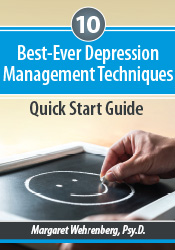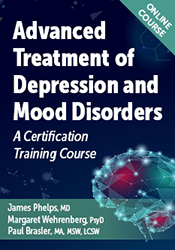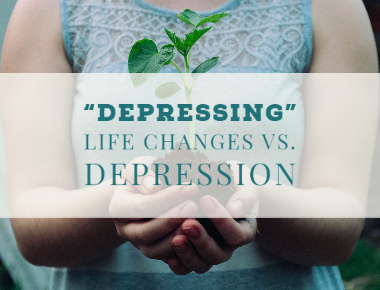How Loss at the Time of Menopause Can Masquerade as Depression
Distinguishing between “depressing” life changes and depression

I have been talking with women lately who are suffering from symptoms they call depression, yet I am hearing something else. Something they don’t want to talk about: loss, grief and menopause.
These are different from each other and different from depression. But I’m struck by how describing themselves as having depression makes it much harder to respond to the issue they have brought to my attention.
Menopause is personally and uniquely experienced, yet universal among women. Even though it’s a common life experience, it comes with great emotional costs. Responses to this change can be mistaken for depression, and may not get the attention and resolution they need.
Cheryl described herself as lethargic and feeling blue: “I’m just down in the dumps. This depression is making it hard to enjoy work or even enjoy that my adult son is finally moving into his own apartment.”
Okay, I’m a psychologist: I had to ask about “empty nest” feelings. She initially said she was very glad about this. “It means I have done my job and now I can have the space at home.”
But as we talked a bit more about life changing, she welled with tears. “This is silly,” she remarked, “I’m probably just hormonal, you know, the menopause thing.” And within a few quiet questions she was fully crying the tears of loss.
She had thought she was depressed, but had not been viewing this time of life as loss — loss of her family as the sons move on, certainly, but she never thought about menopause—the loss of reproductive capacity—as a loss.
To Cheryl, and to so many women I talk with, this feeling of mourning is completely unexpected. They don’t want more children, but they want to have that capacity.
They don’t want to go through pregnancy but they remember the life they felt while expecting and the expecting itself gave them meaning and joy. They won’t be able to feel that again.
The juicy sexuality they enjoyed is clearly going to be different—it seems so already. The rhythms of hormones that defined their months and years are jolting to a halt. All this identity interwoven with evidence of ability to give life is an ending without a replacement. Cheryl said, “I’m so afraid I will be invisible now. I won’t be the same for sure.”
Now, I realize that some women have experienced child-bearing and child-rearing as difficult, stressful or unwelcome. And this mourning I am describing for the loss of self as a sexual being may not apply to all women, but it does to many. We are born gendered and we remain so even after reproduction is not a possibility.
While men may suffer identity challenges when they have difficulty with sexual performance, it is not typically a hallmark event, whereas a woman’s change of life is clearly marked. Her capacity to reproduce is definitively over. There’s no little blue pill to make that go away for a few hours.
I suspect women themselves do not always know that part of this transition is mourning for the loss of the woman she was. I hear statements like:
“I am so depressed about how I look. Everything sags, including my chin, and my spirits. I am so low; I don’t want to go out much.”
“I am so depressed that I can’t fight these wrinkles — I look so ugly. My self-esteem is in the pits. I just can’t imagine ever wanting to look in a mirror again.”
“I am so depressed: no one will ever look at me with desire again.”
But I rarely hear, “I am in mourning for my loss of life-bearing potential.” At least not until we examine the feelings she is having.
Because menopause comes with some physical discomfort it is easy to medicalize the symptoms that look like depression and blame them on hormones.
Probably hormones are somewhat at fault for feeling uncomfortable. But I believe we should look at the meaning of this change and give women an opportunity to feel it honestly and deeply and pass through it to the next stage.
Being allowed to recognize this loss means they can mourn it. They will be able to do so if they are not labeled as depressed and treated in therapy with our standard cognitive treatments. Or worse, treated only with an SSRI or given hormones to stretch out the process.
Depression is a brain-based problem with several solutions. When people are depressed they may not have become that way because of an event or a trauma.
They may have sunk into a depression based on their chronic stress or brain structure/function, and have pronounced symptoms of low energy, loss of interest in life, and even problems with getting daily tasks accomplished.
Feelings of low self-esteem typically accompany depression. “I am worthless,” or “I am inadequate,” are the tones of that inner voice. Even finding energy to do psychotherapy can be problematic.
If I treat Cheryl as if she is depressed, I may deny her an opportunity to recognize she is not depressed. I want her to see that she has interests and energy to find a path that works for her. She has not battled self-esteem all her life, until now. She doesn’t know how to value her Self as an older woman.
It’s a different path, to rediscover what she has always valued and to find new expressions of herself. If she can see that she has a real-life change, and if she can let herself feel it, then she can go on to embrace the rest of her life.
Of course, parents remain parents for life, but it is far different being parent to an older teen or to an adult than it is to a little one. No longer capable of bearing children, a woman is free to enjoy sex without fear of pregnancy.
She can make plans for her life without contemplating what she will have to forego if she is raising another child. She can focus on career or volunteering or any creative exploration of her own wishes, less tethered to the nest-building that her earlier stage of life involved.
She can be with her life partner as a twosome, re-inventing the way they live together. And that new kind of juiciness: the exploration of new ways to be involved in life can be elating.
If you find yourself in conversation with a woman who is “depressed” at this stage of life, see what happens if you can look at it as mourning a loss and then discovering what the next stage may hold. Margaret Mead called that time “post-menopausal zest”! Certainly, an optimistic view for the future after loss.
These are different from each other and different from depression. But I’m struck by how describing themselves as having depression makes it much harder to respond to the issue they have brought to my attention.
Menopause is personally and uniquely experienced, yet universal among women. Even though it’s a common life experience, it comes with great emotional costs. Responses to this change can be mistaken for depression, and may not get the attention and resolution they need.
Consider the Case of Cheryl
Cheryl described herself as lethargic and feeling blue: “I’m just down in the dumps. This depression is making it hard to enjoy work or even enjoy that my adult son is finally moving into his own apartment.”
Okay, I’m a psychologist: I had to ask about “empty nest” feelings. She initially said she was very glad about this. “It means I have done my job and now I can have the space at home.”
But as we talked a bit more about life changing, she welled with tears. “This is silly,” she remarked, “I’m probably just hormonal, you know, the menopause thing.” And within a few quiet questions she was fully crying the tears of loss.
She had thought she was depressed, but had not been viewing this time of life as loss — loss of her family as the sons move on, certainly, but she never thought about menopause—the loss of reproductive capacity—as a loss.
To Cheryl, and to so many women I talk with, this feeling of mourning is completely unexpected. They don’t want more children, but they want to have that capacity.
They don’t want to go through pregnancy but they remember the life they felt while expecting and the expecting itself gave them meaning and joy. They won’t be able to feel that again.
The juicy sexuality they enjoyed is clearly going to be different—it seems so already. The rhythms of hormones that defined their months and years are jolting to a halt. All this identity interwoven with evidence of ability to give life is an ending without a replacement. Cheryl said, “I’m so afraid I will be invisible now. I won’t be the same for sure.”
Now, I realize that some women have experienced child-bearing and child-rearing as difficult, stressful or unwelcome. And this mourning I am describing for the loss of self as a sexual being may not apply to all women, but it does to many. We are born gendered and we remain so even after reproduction is not a possibility.
While men may suffer identity challenges when they have difficulty with sexual performance, it is not typically a hallmark event, whereas a woman’s change of life is clearly marked. Her capacity to reproduce is definitively over. There’s no little blue pill to make that go away for a few hours.
I suspect women themselves do not always know that part of this transition is mourning for the loss of the woman she was. I hear statements like:
“I am so depressed about how I look. Everything sags, including my chin, and my spirits. I am so low; I don’t want to go out much.”
“I am so depressed that I can’t fight these wrinkles — I look so ugly. My self-esteem is in the pits. I just can’t imagine ever wanting to look in a mirror again.”
“I am so depressed: no one will ever look at me with desire again.”
But I rarely hear, “I am in mourning for my loss of life-bearing potential.” At least not until we examine the feelings she is having.
Because menopause comes with some physical discomfort it is easy to medicalize the symptoms that look like depression and blame them on hormones.
Probably hormones are somewhat at fault for feeling uncomfortable. But I believe we should look at the meaning of this change and give women an opportunity to feel it honestly and deeply and pass through it to the next stage.
Being allowed to recognize this loss means they can mourn it. They will be able to do so if they are not labeled as depressed and treated in therapy with our standard cognitive treatments. Or worse, treated only with an SSRI or given hormones to stretch out the process.
Does It Matter That Much What We Call It?
Depression is a brain-based problem with several solutions. When people are depressed they may not have become that way because of an event or a trauma.
They may have sunk into a depression based on their chronic stress or brain structure/function, and have pronounced symptoms of low energy, loss of interest in life, and even problems with getting daily tasks accomplished.
Feelings of low self-esteem typically accompany depression. “I am worthless,” or “I am inadequate,” are the tones of that inner voice. Even finding energy to do psychotherapy can be problematic.
If I treat Cheryl as if she is depressed, I may deny her an opportunity to recognize she is not depressed. I want her to see that she has interests and energy to find a path that works for her. She has not battled self-esteem all her life, until now. She doesn’t know how to value her Self as an older woman.
It’s a different path, to rediscover what she has always valued and to find new expressions of herself. If she can see that she has a real-life change, and if she can let herself feel it, then she can go on to embrace the rest of her life.
Of course, parents remain parents for life, but it is far different being parent to an older teen or to an adult than it is to a little one. No longer capable of bearing children, a woman is free to enjoy sex without fear of pregnancy.
She can make plans for her life without contemplating what she will have to forego if she is raising another child. She can focus on career or volunteering or any creative exploration of her own wishes, less tethered to the nest-building that her earlier stage of life involved.
She can be with her life partner as a twosome, re-inventing the way they live together. And that new kind of juiciness: the exploration of new ways to be involved in life can be elating.
If you find yourself in conversation with a woman who is “depressed” at this stage of life, see what happens if you can look at it as mourning a loss and then discovering what the next stage may hold. Margaret Mead called that time “post-menopausal zest”! Certainly, an optimistic view for the future after loss.
Want more tools and strategies to help treat depression and mood disorders?

Help your clients identify triggers, stop destructive behaviors and start enjoying life again with the
This FREE printable download reveals strategies to help your clients take immediate action so they can find hope and happiness.
This FREE printable download reveals strategies to help your clients take immediate action so they can find hope and happiness.

Become more confident when diagnosing mood disorders, reduce the risk of client suicide and help your depressed clients live more joyfully. Register for this new online course:
Join bestselling authors and dynamic experts James Phelps, M.D., Paul Brasler, LCSW, and Margaret Wehrenberg, Psy.D., for this comprehensive certification training. You’ll discover the differences between pure depression and bipolar disorder, and how to accurately diagnose the mood disorders in between. You’ll go more in-depth into the best ways to help your clients manage and overcome depression, and get actionable steps for creating powerful suicide assessment and intervention systems.
Upon completion of this training, you’ll be eligible to become a Certified Depression & Mood Disorder Treatment Professional (CDMDTP).* Your course tuition includes the cost of certification!
When you become a CDMDTP you set yourself apart from thousands of other clinicians. Certification sends the message that you have what it takes to help your clients take control of their lives so they can have a brighter future.
Join bestselling authors and dynamic experts James Phelps, M.D., Paul Brasler, LCSW, and Margaret Wehrenberg, Psy.D., for this comprehensive certification training. You’ll discover the differences between pure depression and bipolar disorder, and how to accurately diagnose the mood disorders in between. You’ll go more in-depth into the best ways to help your clients manage and overcome depression, and get actionable steps for creating powerful suicide assessment and intervention systems.
Upon completion of this training, you’ll be eligible to become a Certified Depression & Mood Disorder Treatment Professional (CDMDTP).* Your course tuition includes the cost of certification!
When you become a CDMDTP you set yourself apart from thousands of other clinicians. Certification sends the message that you have what it takes to help your clients take control of their lives so they can have a brighter future.
* Professional standards apply.
Meet the Expert:
Margaret Wehrenberg, Psy.D., a licensed clinical psychologist, is the author of 6 books on the treatment of anxiety and depression, including her most recent book for the general public, The 10 Best Anxiety Busters. An expert on the treatment of anxiety and depression, she has extensive training and expertise in the neurobiology of psychological disorders. She earned her M.A. specializing in psychodrama and play therapy with children. Dr. Wehrenberg has years of experience as a drug and alcoholism counselor, working with the U.S. Army in Germany and Lutheran Social Services in Illinois. She also has training in trauma treatment, EMDR, and Thought Field Therapy. She has a private psychotherapy practice in Naperville, IL, specializing in treating anxiety. In addition to clinical work, she coaches business professionals on managing anxiety, she frequently contributes articles for Psychotherapy Networker magazine, and she has produced Relaxation for Tension and Worry, a CD for breathing, muscle relaxation and imagery to use with anxious clients. Her book, The 10 Best-Ever Anxiety Management Techniques, published by W.W. Norton, is a consistent top seller for anxiety management.
Learn more about her educational products, including upcoming live seminars, by clicking here.
Learn more about her educational products, including upcoming live seminars, by clicking here.



